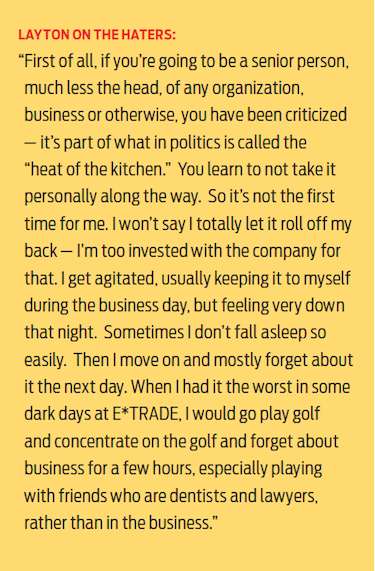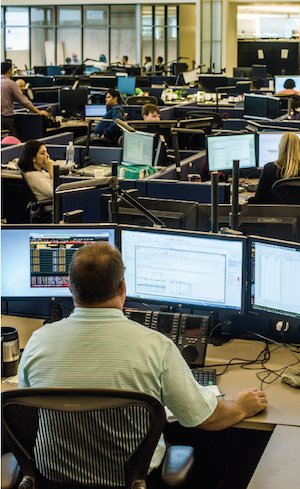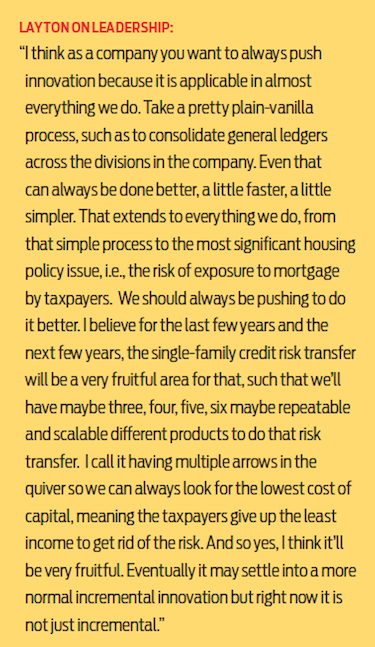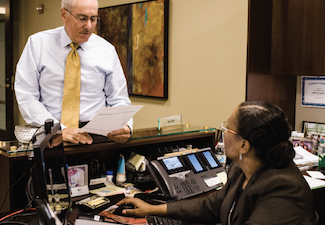Layton is a different kind of chief executive officer than the other CEOs interviewed by HousingWire over the years. Layton, for what’s it’s worth, values engagement above all else.
THE BEST OF IT
It’s an otherwise random Thursday morning. Freddie Mac’s earnings are out. The secondary mortgage market company is raking in profits and sending checks to the Treasury, its bailout still yet to be paid back. Was Freddie in OK shape before the credit crisis? It’s arguable. Did it need to be taken over by the government? That’s not arguable, because it was.
Should Freddie go private? Where is housing reform? Can Congress get out of its own way and do something about this housing mess?! The questions continue to smolder in the back of my mind. The phone rings; I pick it up. On the other end is Don, and he speaks, “How can I help you this morning, Jacob?”
And so go his regular, quarterly calls with journalists. That outreach is routine for Layton and practiced by precisely zero other CEOs in the mortgage industry space. And it’s this engagement that drives the approachability of Layton’s character. In speaking casually to several VPs at Freddie Mac, they all find a common thread of comfortable working conditions with Layton. Layton understands the nature of the pressure cooker that is Freddie Mac, and his colleagues love him for it.
If making profits only to funnel them back to Treasury and not make good on your own Federal debts in the process is a woeful task, it doesn’t show on Layton. But it shouldn’t surprise anyone; that’s his specialty.
From 2007 to 2009 he served as chairman and then CEO of E*TRADE Financial, which he shepherded through the financial crisis. During his reign, E*Trade was a top 50 mortgage servicer, with $18 billion worth of mortgages serviced in 2009 and $23 billion in 2008.
“Don brings strong executive leadership and a deep understanding of financial markets at a pivotal time for Freddie Mac,” said Christopher S. Lynch, Freddie Mac’s non-executive chairman, at the time. “His operating experience, analytical rigor and boundless energy make Don the right leader to continue our important work of supporting the nation’s housing market and helping America’s families, and to guide Freddie Mac in helping build a stronger framework for the future of housing finance.”
 For readers of HousingWire, the logic behind his move to Freddie Mac made sense, except for Layton’s personal finances. Moving to the CEO position at Freddie Mac would significantly cut his compensation, but Layton didn’t seem to care about that.
For readers of HousingWire, the logic behind his move to Freddie Mac made sense, except for Layton’s personal finances. Moving to the CEO position at Freddie Mac would significantly cut his compensation, but Layton didn’t seem to care about that.
“I tend to be a fast-mover,” he told me when he took the position at Freddie Mac about three and a half years ago. Back then, he added that he felt operations at Freddie are a hybrid of corporate and government business models. “The company is a for-profit, but it’s also a not-for-profit, so I have to go in with an open mind on issues and not any preconceived notions.”
Layton added that he was not going to approach the position as a corporate CEO and acknowledged that cooperation with the Federal Housing Finance Agency remains vital. Furthermore, he remains committed to serving the interests of the American taxpayer. He even resigned his board position at American International Group to take the top spot at Freddie Mac. He didn’t want to appear conflicted.
STARTING AT FREDDIE MAC
Today, he remains as committed to the position as he was on day one. Though some things needed to be changed at Freddie Mac, first.
“As far as I’m concerned [Freddie] should operate just like one of the best large financial institutions, regardless of the duopoly or government support,” Layton said in his most recent, extended interview with HousingWire. Yet, there were several reasons why this wasn’t the case at Freddie.
For one, Layton said that he felt customer service wasn’t up to what it should be because of the duopoly mentality. Often, people’s energy and dedication to work wasn’t what it should have been, he felt. From Layton’s viewpoint, the effort to be as good as the best financial institutions wasn’t there, because the GSE didn’t have to be prior to its conservatorship.
“Then there was the very tough time for the company in the early years of conservatorship. I’m not sure which analogy or phrase you like to describe those years, but some people say ‘deer in headlights,’ some people say ‘beaten down,’ but whatever it was, it lasted a long time. What was the objective for the company during those years? It wasn’t clear. What was the goal of the company other than to just generally keep doing what it was doing?”
Layton decided things needed to change.
First of all, he believes that if you want people to be energized at work, then you have to have goals at work. You can’t say the objective today is the exact same thing as yesterday.
“So, in 2012, we got two sets of goals for the company and its people,” Layton said.
“One, in early 2012, the FHFA put out the first Conservatorship Scorecard; then later in the year I introduced a corporate scorecard which included more commercial items than the housing policy items in the Conservatorship Scorecard,” he added.
“So we set goals and we started benchmarking ourselves versus being the best in the industry, whether it was in IT or in how many people you needed in HR and we set some specific targets to be really good. That energized a lot of people and it showed up in some pretty dramatic changes,” Layton said. “For example, our customer service in Single-Family is dramatically better than it used to be. The customers know, they notice it.”
Working with the FHFA would be also key, Layton realized early on. And he was ready. Layton has over 35 years of experience in financial services and as a corporate leader. He worked for nearly 30 years at JPMorgan Chase and its predecessors, starting as a trainee and rising to vice chairman and member of the three-person Office of the Chairman, retiring in 2004.
In his career at JPMorgan Chase, Layton’s responsibilities spanned capital markets and investment banking, consumer banking, and operating services. From 2002 to 2004, he was responsible for Chase Financial Services, the consumer and middle market business, which included the fourth-largest mortgage firm in the U.S. He was co-chief executive officer of J.P. Morgan, the investment bank of the company, from 2000 to 2002 and oversaw its entire range of global activities.
Prior to the merger of Chase Manhattan and J.P. Morgan in 2000, Layton was responsible for Chase’s worldwide capital markets and trading activities, including foreign exchange, risk management products, emerging markets, fixed income, and the bank’s investment portfolio and funding department. As well, he was responsible for Treasury & Securities Services, the operating services unit of the company, from 1999 through 2004. His secret there was his adaptability, as he mentioned when we caught up again recently.
 “I ended up rising through the capital markets business in the investment banking side of what became JPMorgan Chase. Given the nature of that kind of business, i.e., in the trading rooms — where I was the trading room business head for a long time — executives cannot just be administrators and managers. They must use their market skills and knowledge directly to make a profit; they must call on clients to win deals; they must have a view on securities price movements.”
“I ended up rising through the capital markets business in the investment banking side of what became JPMorgan Chase. Given the nature of that kind of business, i.e., in the trading rooms — where I was the trading room business head for a long time — executives cannot just be administrators and managers. They must use their market skills and knowledge directly to make a profit; they must call on clients to win deals; they must have a view on securities price movements.”
Layton said this is one of the hard things to do in an investment bank – you have to both run your organization and be a revenue producer, too.
“So the entire style of my history is working with people and it wasn’t just in a hierarchical way – if you needed someone to help you get a deal done, you called them whether they were three layers down or one layer down,” he explained. “I never regarded the hierarchy as some kind of constraint on me. You know you need to be out with your people talking to them and such to be successful, so that was very much my background in investment banking, as opposed to perhaps an industrial company where the boss has formal meetings about everything and it’s all about process.”
He served as a senior advisor to the Securities Industry and Financial Markets Association from 2006 to 2008, so he’s familiar with the regulatory environment.
But what he may be most proud of are the accomplishments that go largely unreported. Layton is chairman of the board of the Partnership for the Homeless, a nonprofit dedicated to reducing homelessness in New York City. This is something about him rarely mentioned, probably because he doesn’t take to tooting his own horn.
ALWAYS TAKE THE CALL
Over the years, the legacy of Donald Layton slowly began to be chronicled on the pages of HousingWire.com. His devotion to improving the operations at Freddie Mac for both his workers and homeowners began to take shape.
He never suggests an angle to take on our conversations, and I’ve never learned if he either liked or dislike the ensuing coverage. But the calls continued, and so did the flow of information.
In 2014, one year in, Layton declared at the Mortgage Bankers Association Annual Conference & Expo, his firm was becoming more competitive in the mortgage market and would look to see how its “credit box could be more fully utilized.”
The comment came at a time of deep criticism amid calls for the company to be dissolved. “Freddie should stop issuing. Every time Fannie Mae sells a bond, Fannie should buy a legacy Freddie bond, until the issue is resolved,” said one such attendee I spoke to before Layton’s panel.
Layton indirectly responded by saying a move to a common securitization platform was an initiative that would help Freddie Mac achieve its goals of remaining competitive. In July 2015, the FHFA announced more concrete steps toward achieving this goal. This is one thing a very patient Layton understood just one year into his job.
This development is all part of nonlegislative reform intended to improve mortgage financing, Layton said. However, this often goes unnoticed, the Freddie CEO indicated, largely because media does not cover it as an umbrella subject.
Legislative reform would take much longer. Layton said then, that while it’s “hard to predict politics,” any reform, once passed, would be at least several years before beginning implementation.
In the two years that followed we began to get somewhere with our talks. HousingWire readers were getting a fuller picture of what was happening at Freddie Mac.
A month after the MBA panel, Layton called again. He didn’t mention the recent criticism and I didn’t ask. Instead he gave me his four biggest challenges going forward. And, considering HousingWire is always “Moving Markets Forward,” I published these four goals:
– 1 –
Updated software
Layton said some of their vendors used more recent software that Freddie’s systems couldn’t support. This has changed and operations are now quicker and smoother.
– 2 –
Enhanced cybersecurity
Given my mortgage sits with them, this one is my favorite. Under Layton, Freddie enhanced the encryption of personal information. If you work at Freddie, “you can’t stick in a memory stick and start downloading things,” he said. Good to know.
– 3 –
Offsite data recovery
Freddie Mac is establishing a data recovery center in Colorado. Not only is your info safe, it’s also somewhere else. This will be helpful in the case of a major catastrophic event that compromises Freddie Mac operations in Virginia, or elsewhere.
– 4 –
Alternatives to FICO
Freddie Mac measures and analyzes the credit risk of homeowners on its own, Layton said. However, there are calls for the GSEs to update their use of FICO. Layton said they are, and they may be looking to add other credit score providers. He said they are “studying one or two alternatives to FICO.”
Another subject, which gained some steam in the mainstream press but didn’t get much airtime from me, was the 3% down program Fannie and Freddie both announced. While making for a grabby headline, we both knew it would never become a huge product, considering strict underwriting standards. Still, Freddie didn’t need it, though profits are beginning to slow.
Layton indicated that internal targets for the product in 2015 are likely not nearly as high as many expect. So, the expectation is for responsible, stable lending to extra-worthy borrowers, which is reflected in the slightly revised 2015 mortgage originations forecast of $1.3 trillion, up from $1.2 trillion. The forecast for the refinance share of originations in 2015 was also revised up from 35% to 40%.
 Freddie Mac just this May reported its 14th quarter of positive earnings, and the CEO continues to believe the government-sponsored enterprise will move from strength to strength.
Freddie Mac just this May reported its 14th quarter of positive earnings, and the CEO continues to believe the government-sponsored enterprise will move from strength to strength.
However, Layton said a new development is that Freddie Mac was now prepared for any housing reform package that passes legislation.
While much is made of Corker-Warner, Johnson-Crapo and other attempts to finally return the GSEs to the private market, less attention is given to the disruption such lawmaking may have on the internal, day-to-day operations at the housing behemoths.
Layton said that Freddie Mac aligned operations so that “any legislative solution will be easier to implement.” So that’s a vote of confidence for mortgage bond investors, and there’s more.
Freddie Mac continues to push the taxpayer more into the catastrophic loss position, which means in the unlikely event of a bailout, the extent of aid necessary from the Treasury will be minimized. Fears of another rescue are generally understood to be overblown.
However, Layton said investors continue to enjoy the risk exposure offered in the STACR and ACIS deals and said the R&D is well under way for “several other types” of risk-sharing products.
“The capital markets can absorb more,” Layton said, “so it’s a question of how far that can go.” While Layton could not go into great specifics, he did add that Freddie Mac is looking at both TBA and “non-TBA” options.
One of the challenges though, remains the return of capital to the Treasury. “We work as if we have capital,” Layton explained. But, still, there is the balance of not having real capital to buffer against risk-product innovation. The model is to currently shed risk if it comes at a low cost to Freddie Mac and hold risk if unwinding it would be considered a high cost.
This method is probably best evidenced with the following announcement from the company’s first-quarter earnings: “Freddie Mac reclassified certain seriously delinquent single-family mortgage loans from held-for-investment to held-for-sale in the first quarter of 2015. This reclassification resulted in a benefit for credit losses, offset by lower other non-interest income and higher non-interest expense.”
ANOTHER KEY DIFFERENCE
Fannie Mae traditionally is the big sister to Freddie Mac. Under Layton, that is beginning to change. The most recent example of the rising competition was seen between the bespoke underwriting software solutions Desktop Underwriter (Fannie) and Loan Prospector (Freddie). Earlier this year, Freddie made using LP a free service and Fannie soon followed with DU. Layton understands that DU has a much larger market position. But encouraging a larger use of LP, Layton says ,will help the company better serve its markets.
“When we buy loans that are analyzed by LP, we get a better handle on the credit; when we buy loans that come from DU we have a weaker handle on the credit. Therefore, we as a specific firm want to encourage people to use LP. This is combined with plans to improve LP to help in turn improve our credit management,” he said.
“As a GSE, of course, credit risk management is the most important thing we do,” he added, but the move also symbolizes a larger, key difference.
“Leadership in the housing finance industry for the last 50 years has been by Fannie, with Freddie always in its shadow. That’s not the case now as Freddie has taken clear leadership positions on several things, although certainly not everything. This is very different than in the past and a lot of people in the business are noticing,” he said.
 “That’s what can happen when your people are unleashed … it makes a big difference for a company,” Layton concludes.
“That’s what can happen when your people are unleashed … it makes a big difference for a company,” Layton concludes.





